In a statement, Zuckerberg emphasized that edited messages would be clearly marked with an "edited" tag next to the timestamp to indicate the modification.
However, the messaging application will not retain a history of corrections, meaning that other users will not be able to view previous versions of the edited messages.
Zuckerberg highlighted that this new feature would provide users with increased control over their conversations.
Furthermore, he assured users that personal messages, media content, and calls would continue to be safeguarded by end-to-end encryption, ensuring their privacy and security.
Did you read this?
"For the moments when you make a mistake, or simply change your mind, you can now edit your sent messages. From correcting a simple misspelling to adding extra context to a message, we're excited to bring you more control over your chats," the statement read in part.
If a user wants to edit a message, he or she is instructed to long-press on the sent message and choose edit from the menu.
As stated earlier, the feature only lasts for fifteen minutes. According to Zuckerberg, Meta has already rolled out the feature to users globally, and it will be available to all Android and iOS users in the coming weeks.
Meta has been diligently introducing innovative services and features to provide users with state-of-the-art experiences. In a recent announcement, Zuckerberg unveiled a new functionality on WhatsApp, enabling users to lock and conceal their conversations.
This new feature involves removing a specific chat thread from the regular feed of the application and relocating it to a separate folder. Access to this folder is granted exclusively through a password or biometric authentication.
Zuckerberg reassured users that the Chat Lock feature would effectively safeguard private and intimate conversations. With notifications from these locked chats being hidden, users can have greater peace of mind regarding the confidentiality of their discussions.
"New locked chats in WhatsApp make your conversations more private. They're hidden in a password-protected folder and notifications won't show sender or message content," the statement read in part.












